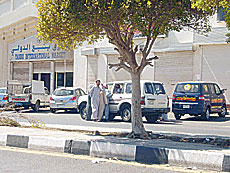YANBU, 15 June 2007 — The first thing that will catch the attention of anyone traveling on the old airport road in Yanbu is the large number of expatriates loitering around looking for jobs. As soon as a car stops, the men flock to the driver’s side offering their services.
To an onlooker, it looks as if the car is distributing money. The expatriates spill on to the road causing traffic jams and sometimes, with the competition intense, fighting each other.
“They gather from early in the morning till late at night. They insist on staying there in spite of people’s objections to their presence. They fight all the time and have become an eyesore,” said Khaled Al-Juhani, a local Yanbu resident.
He added that the workers are not necessarily overstayers and that the majority possess legal iqamas. This leads to the question, why do they gather like this?
“These people have arrived in the Kingdom with legal iqamas to work in specific professions. In turn their sponsors have pushed them out onto the street to look for work and take a monthly amount from them,” said Al-Juhani, referring to the illegal practice of Saudis calling workers into the Kingdom and then forcing them to find work elsewhere.
“It is sad that Saudis are responsible for this. They don’t care about Saudi Arabia and are more concerned about making money,” said Al-Juhani, adding that in Yanbu non-Saudis own much of the local trade.
“Although from the outside it looks like many of these businesses are 100 percent owned by Saudis, in reality the real owners are foreigners, who pay Saudis a monthly percentage. This is the case with grocery stores, barbershops, restaurants and other stores,” he said.
Saudi Adel Al-Harbi, another Yanbu resident, said, “I don’t think you can call them overstayers, they all have legal iqamas. They are legal workers who do not work with their sponsors and are instead working for themselves paying their sponsors monthly fees, which is a slave-system in my eyes.” He added that the problem exists across the Kingdom. “However, it’s now spreading very fast in Yanbu. The system can’t stop them, it’s up to Saudis and whether they care about the rules and regulations of their country,” said Al-Harbi.
Most of the expatriates working like this are not specialized in any field and nor do they have experience in the field that they work in.
Al-Harbi added, “We don’t see the Passport Department doing anything to stop them or any other government department doing anything else to put an end to this problem.”
One of the workers, who did not want his name to be mentioned, said that working independently is financially better than working for someone or at a workplace. “By doing this we manage to save more money. We can easily please our Saudi sponsors with any amount of money he wants. If he wants SR1,000 we will give it to him and if he wants SR2,000 then we’ll hand that as well. Sometimes we manage to earn up to SR10,000 a month in construction, electricity or plumbing work,” he said.
Khaled Al-Hamrani, a local Yanbu resident, said, “Now foreign workers are paying Saudis salaries instead of Saudis paying them salaries. Saudis obtain commercial certificates and then arrange visas for foreign workers. These visas are sold on the black-market for SR6,000 each to other Saudis, who in turn bring foreigners into the Kingdom and get paid SR1,000 and SR2,000 a month.”
He added, “At the end of the day, the Saudis are happy since they manage to get monthly fees from these workers for nothing. The workers are also happy because they earn more than they normally would and are independent to do what they wish. You see foreigners all the time opening shops and driving fancy cars.”
Maj. Lafi Al-Refaie, head of the Expatriate Department at the Yanbu Passport Department, said that monitoring these types of workers is the responsibility of the Labor Office. “We only catch those with illegal iqamas and who don’t have legal status to be in the Kingdom,” he said.


